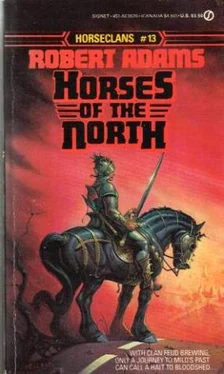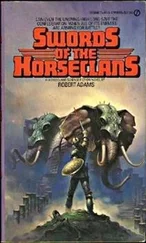Scott paused and tugged at a greasy rawhide thong looped about his sinewy neck, then pulled up from beneath his shirt a bit of metal. Flattish it was, almost two inches across, two of its three edges rough and jagged-appearing, for all that all edges and surfaces were pitted with oxidation and shiny with the patina of years.
Milo instantly recognized the thing, knew what it once had been—shrapnel, a piece of shell casing—and he could not repress a shudder, for he had hoped that that particular horror of warfare, at least, was long years gone from a suffering world.
Scott resumed his heated narrative. “This here thing, it pierced my grandpa’s pore laig, right at the same time that some suthin tore the whole front end off of his hoss. My pa and his brother, they dragged grandpa away then, and they said that was the onliest reason any of them lived to tell ’bout it all, too. ’Cause after them dirty, selfish murderers had done shot or burned or tore into pieces all them pore mens, they come out’n that there fort with rifles and great big guns and I don’t know whatall. Some was on horses, but most was on or in big old steel wagons what my grandpa used to call ’tanks’ a-shooting faster than you could blink your eyes and throwing out sheets of fire a hunnert feet long.
“Them bloodthirsty bastards, they kept after them pore folks for twenny mile and more. They kilt every man they could and then just left their bodies a-laying out for the coyotes and wolfs and foxes and buzzards, they did.
“And ever sincet then, their riders has done kilt or tried like hell for to kill every man they come on anywheres near here. For more nor thutty year, they done been killing for no damn reason, mister. We tried to put a stop to it, too, not that it got us all anything, ’cepting for dead relatives and friends and hosses.
“Twelve years ago, when my pa still was chief, we joined up with nearly a thousand other mens from all ’round here on the prairies and we come down on that place down there.”
Milo shook his head slowly. “I’ll say this, your father had guts—about a mile of them—but he, of all people, considering what he’d been through before, should have realized that you can’t successfully oppose armored vehicles with horse cavalry, or use cavalry to attack well-fortified positions equipped with rifles and artillery. How many did you lose on that occasion, Chief Gus?”
“Well,” answered Scott, “he’d done heard from the traders and some others that won’t none of the steel wagons would work no more, and I guess as how that was right, too, ’cause they come out of the fort—some on hosses, but most on their feet and with great long old spears. They stood up in a square-like bunch and put their hosses in the middle and we rode down on ’em, but them old spears was so damn long that they stuck out way past the lines of men, and when the hosses got pricked with ’em a few times, won’t no man could get his hoss to go close again. And all the time, it was bastards standing there with crossbows and rifles and prods and some them fellers on hosses in the middle with real bows just a-shooting down man after man. Finally, one of the bugtits shot my pa and then everybody just tucked tail and ran and the damn bastards come after us with their own damn fresh hosses and killed off a lot more pore mens from ahind. That’s the kind of backstabbing, selfish murderers they is, you see, mister.”
“So,” said Milo, “you’ve spent ten or twelve years breeding and now you’re ready to ride down there and have the most of a new generation of young men butchered and maimed, eh? Well, Chief Gus, this is not my tribe’s fight and I’d far liefer ride a few miles out of our direct route to the high plains than to get involved in such a matter, thank you.”
Scott shrugged. “I didn’t ask for your help, did I, mister? I would of been willing to let you folks ride along of us all and share in the loot and stock and womens and all, but the way I done heard it, it probly ain’t going to take all what old Jules and me has got, much less of your folks, too.
“See, Squinty Merman, the trader, come th’ough in early summer and allowed as how them bastards over there at MacEvedy Station is in some kind of a bad way. Seems as how they had bad crops for two years running, then damn near no crops a-tall, last year. They done et up all what they had stored, their seed grain, too—had to eat a lot of their critters and done had a bad spate of a sickness that’s done took off a lot and left the rest damn poorly.
“Well, Mr. Moray, I figgered right then and there it couldn’t be no better time for to go ’bout paying back the murdering bastards for everything they’d done done to us and our grandfolks and all, so I sent riders out to fetch back old Jules and the rest of the boys. I told them to bring all the fighters they could and that we’d all meet here. Then my own folks and me, we moved on down here and set up our camp and waited for them as was coming.
“Since we all got here, it’s been damn few of them bastards has come out of that fort and all, and”—he chuckled coldly—“it’s damn fewer of the fuckers what done made it back ahind them walls. ’Course, we did lose us some damn good boys and some hosses, too, afore we came to find out just how godawful far them frigging rifles can shoot and kill a man at. But since we done learned how far we has to stay away from them, we ain’t lost but two men, afore today, leastways, and won’t neither one of them kilt by them bastards and their fucking rifles.”
Arabella Lindsay laid aside the body brush and the currycomb, dipped the dandy brush into the bucket of water and then after she had tossed the full mane of the dapple-gray stallion over to the off side of his neck, she began to brush his crest.
More than seventeen hands of bone, sinew and rolling muscles, the great beast stood stock-still, occasionally whuffling his physical pleasure, while all the time in completely silent, telepathic communication with this small two-leg creature whom he adored.
“But this horse needs to run, to run hard.” His beaming was becoming a bit petulant. “Trotting around the inside of the quadrangle is almost worse than no exercise at all. This horse is becoming stiff. We don’t need to go far, just a few miles and then back.”
“Capull, Capull,” the girl silently remonstrated. “I’ve been through all of this nearly every day for weeks now. There are enemies, evil, thieving, murderous men, camped all about the fort and the station, who already have killed many of our folks and stolen or killed their horses and cattle. There are no longer enough men of fighting age left hale enough to go out and drive these skulkers away, as was done in years past, and so we just must abide within our walls until they choose to go away.”
She sighed and laid her cheek against the stallion’s glossy neck. “Poor, poor Father—he is so frustrated by it all. He would like nothing better than to take out his pikemen and crossbowmen and riflemen and cavalry and trounce these filthy, bestial rovers as thoroughly as he did years ago, but all the deaths from illness and hunger this last year have so reduced the garrison that he no longer has enough force to even defend these walls, much less to mount a field operation against the skulkers. I think, as do Father and Director MacEvedy, that only fear of the two big guns and the mortars has kept them from attacking our very walls, Capull, but if they knew just how few loads there are remaining for not only them but for our rifles … Oh, Capull, I am so very frightened. I’m only fifteen, and I don’t want to die, but poor Father is so very, very worried about so many, many things that I cannot but keep a brave face and demeanor in his presence. You are the only friend with whom I can talk freely. I love you so, my dear Capull.”
Читать дальше












